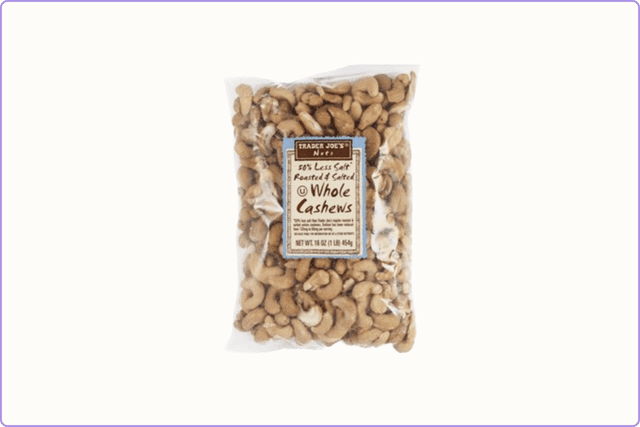Trader Joe’s Cashew Recall: Nuts Could Be Contaminated with Salmonella
Trader Joe's 50% Less Salt Roasted & Salted Whole Cashews have been recalled over concerns of potential Salmonella contamination, the company announced on Sunday.
The cashews were sold at Trader Joe's stores in 16 states, and can be identified with specific lot numbers and best by dates.
No illnesses have been reported yet, and customers are being asked to return any recalled products for a refund.
Trader Joe’s has issued a recall of its low-salt whole cashews due to potential Salmonella contamination.
Wenders LLC, the distributor of Trader Joe’s 50% Less Salt Roasted & Salted Whole Cashews (SKU Number 37884), notified consumers of the recall on Sunday.
The affected cashews were sold in Alabama, Arkansas, Arizona, California, Colorado, Idaho, Kansas, Louisiana, New Mexico, Nevada, Oklahoma, Oregon, Tennessee, Texas, Utah, and Washington.
The potentially-contaminated product have the following identifying information:
Lot number T12139; Best by February 21, 2025
Lot number T12140; Best by March 1, 2025
Lot number T12141; Best by March 8, 2025
Lot number T12142; Best by March 10, 2025

FDA
Customers can also check the packaging for the product’s country of origin—the recalled 50% Less Salt Roasted & Salted Whole Cashews are from India or Vietnam.
So far, no illnesses have been reported in connection to the Trader Joe’s cashews. Wenders LLC said it was alerted to the issue after Food and Drug Administration (FDA) testing found “at least one of the recalled lots tested positive for the presence of Salmonella.”
It’s not clear how the cashews became contaminated with the potentially-dangerous bacteria.
This announcement comes on the heels of another Trader Joe's recall—on March 4, the company recalled its popular Steamed Chicken Soup Dumplings over concerns that the product could be contaminated with hard plastic pieces.
Customers who purchased the 50% Less Salt Roasted & Salted Whole Cashews shouldn’t eat them, and can return any recalled cashews to any Trader Joe’s for a refund. Those with questions can contact the distributor via email at foodsafety@wendersllc.com.
Why Is Salmonella Such a Concern?
Though no Salmonella infections have yet been reported in connection to this cashew recall, the potential contamination is a major health concern.
The bacteria Salmonella can cause gastroenteritis, or diarrheal illness, ranging from mild to severe. People who get salmonellosis, or a Salmonella infection, usually experience fever, stomach pain, diarrhea, and occasionally headache, nausea, or vomiting.
Salmonella causes more cases of foodborne illness than any other bacteria, according to the Centers for Disease Control and Prevention (CDC). The organization estimates that there are 1.35 million Salmonella infections annually, including over 26,000 hospitalizations, and 420 deaths. Most of these cases stem from food.
Chicken may be the food most commonly-associated with Salmonella, but other foods can be contaminated as well. Within the last year, there have been outbreaks of Salmonella linked to flour, diced onions, and ground beef. The CDC also warns that turkey, pork, eggs, fruits, sprouts, nut butters, and other processed foods can cause infections.
In 2016, contaminated pistachios from Wonderful Pistachios—sold at Trader Joe’s and other retailers—led to 11 salmonellosis cases. The FDA also has multiple risk assessment reports published regarding the potential link between tree nuts and Salmonella—this was spurred by a string of recalls and outbreaks in the 2010s, including possible Salmonella contamination in pine nuts, cashew nuts, walnuts, pistachios, and more.
Usually, people who get sick with Salmonella recover on their own, and most likely cases aren’t reported to health agencies. But for some people, salmonellosis can be a serious or even deadly infection.
It’s very rare, but in some cases the bacteria can travel into the bloodstream and cause other illnesses such as arthritis (an infection of the joints) or endocarditis (an infection of the heart).
These life-threatening infections are more common in people that have weaker immune systems, including children under the age of five, adults 65 and older, and people who are immunocompromised due to conditions such as diabetes or cancer.
Related: How Is Food Poisoning Treated?
For more Health.com news, make sure to sign up for our newsletter!
Read the original article on Health.com.

